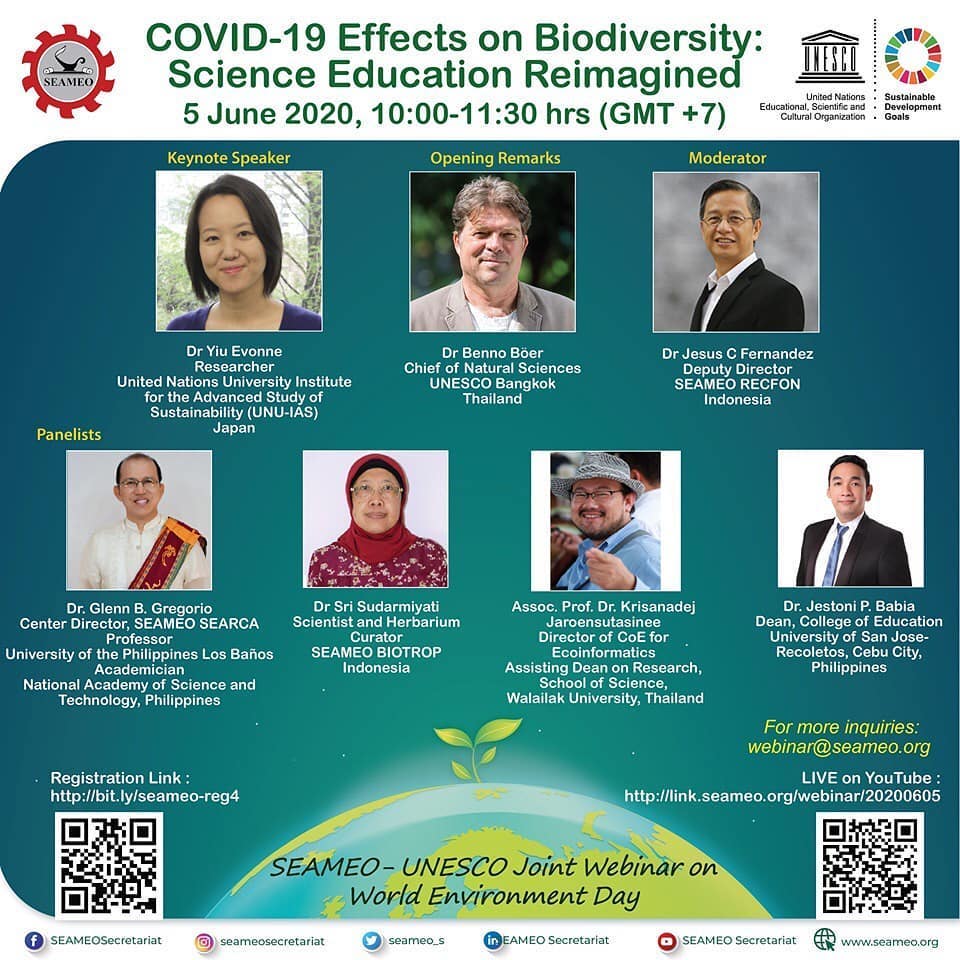
“For the longest time, our food production systems have been the main drivers of biodiversity loss,” surmised Dr. Glenn B. Gregorio, Director of the Southeast Asian Regional Center for Graduate Study and Research in Agriculture (SEARCA).
According to the Food and Agriculture Organization of the United Nations (FAO), “once lost, biodiversity for food and agriculture – i.e., all the species that support our food systems and sustain the people who provide/grow our food – cannot be recovered.”
Dr. Gregorio will thus speak on how crucial agricultural transformation through agricultural innovation is for food systems to achieve a balance between biodiversity conservation and socio-economic wellbeing at the SEAMEO Webinar on World Environment Day to be held on 5 June 2020.
Themed “COVID-19 Effects on Biodiversity: Science Education Reimagined,” the webinar is jointly organized by the Southeast Asian Ministers of Education Organization (SEAMEO) Secretariat; the United Nations Educational, Scientific and Cultural Organization (UNESCO); the UN Environment Programme (UNEP); and SEAMEO Regional Centers.
“We will push to invest in sustainable agriculture through various modalities of agricultural innovation and show how to better recover from the COVID-19 pandemic with a reinforced view in our education system to ensure lasting, systemic impacts,” said Dr. Gregorio, who is also an Academician of the National Academy of Science and Technology (NAST) of the Philippines and Professor at the University of the Philippines Los Baños (UPLB).
As carefully laid out in its 11th Five-Year Plan (2020-2025), SEARCA has identified major interventions to ensure that agro-biodiversity resources produced by the agricultural food systems in Southeast Asia become sustainable and will be enjoyed by all. These include Open Innovation and Agri-Incubation systems that are driven through strategic academe-industry-government interconnectivity models. Other interventions are Knowledge and Technology Transfer Systems enabled by a systematic intellectual property policy and Project Development, Implementation, and Monitoring and Evaluation related to programs on agricultural innovations that result in significant increases in yield and income while ensuring environmental sustainability and social inclusivity.
As part of its role as an enabler and champion of excellence in agricultural and rural development (ARD) in Southeast Asia, SEARCA has also identified the need for a massive value reorientation in the region's educational system on agriculture from being a mere production activity to being a sustainable agribusiness venture with multiple co-benefits in terms of socio-economic welfare and biodiversity conservation. SEARCA will thus strengthen partnerships with various educational institutions, particularly with educators, extension workers, community thought leaders, and students, among others.
Led by the SEAMEO Secretariat, the webinar intends to promote environmental awareness and education for sustainable development and to share existing initiatives and efforts at the national and regional level for promoting biodiversity, and ecosystems. It will also explore educational solutions for promoting biodiversity in the new normal and discuss recommendations on Post-COVID-19 rehabilitation initiatives.
The other speakers at the webinar are Dr. Benno Böer, Chief, Natural Sciences Section, UNESCO Bangkok Office; Dr. Yiu Evonne, Researcher at the United Nations University Institute for the Advanced Study of Sustainability (UNU-IAS), Japan; Dr. Sri Sudarmiyati of the SEAMEO Regional Centre for Tropical Biology (BIOTROP) based in Indonesia; Dr. Krisanadej Jaroensutasinee, Director of CoE for Ecoinformatics, Assisting Dean on Research of School of Science, and NASA Scientist Fellow on Southeast Asia Composition, Cloud, Climate Coupling Regional Study Campaign at Walailak University, Thailand; and Dr. Jestoni Babia, Dean of the College of Education, University of San Jose-Recoletos, Philippines.
Policymakers, educators, teachers, and students from Southeast Asian countries and outside the region are expected to join the webinar using YouTube Live on 5 June 2020 starting at 10 AM, Bangkok time.